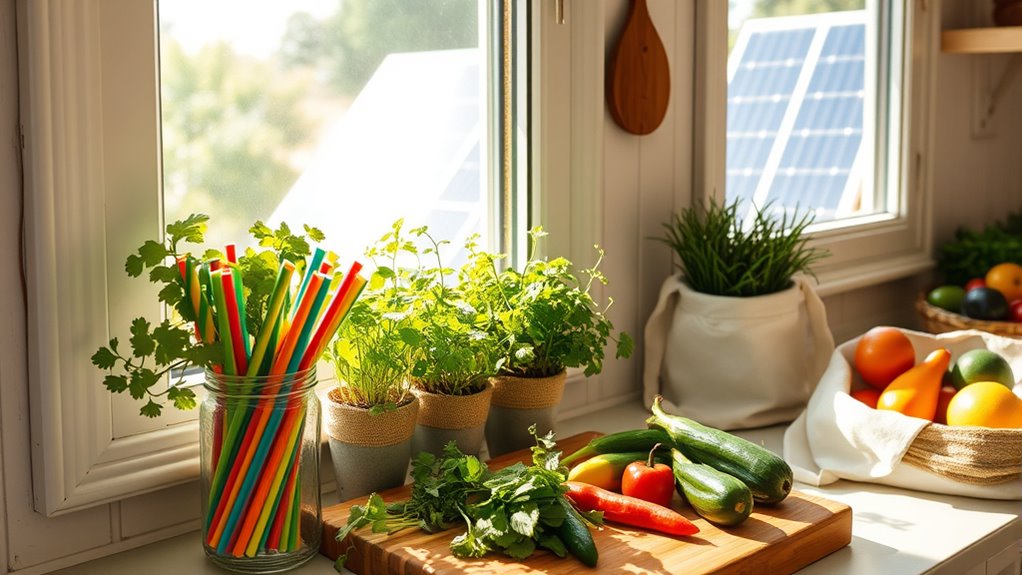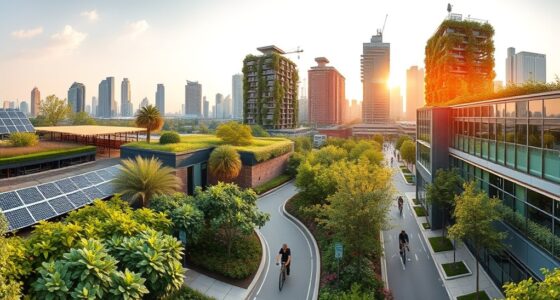You can make a big difference with just a few small changes to your life. Start by using reusable bags and refillable water bottles to cut down on waste. Buying second-hand items and composting food scraps helps reduce landfill contributions. Install LED light bulbs to save energy, and try to eat less meat for both health and environmental benefits. Choosing eco-friendly cleaning solutions and adopting a minimalist mindset promotes sustainable living. There's plenty more you can do to help!
Key Takeaways
- Switch to LED light bulbs to reduce energy consumption by up to 90% and lower electricity bills.
- Use reusable bags to minimize plastic waste and contribute to a healthier environment.
- Opt for refillable water bottles to cut down on plastic waste and save money over time.
- Incorporate meat-free days into your diet to lower greenhouse gas emissions and promote better health.
- Embrace mindful consumerism by prioritizing quality over quantity, reducing waste and supporting sustainable businesses.
Use Reusable Bags

While you mightn't think much about the bags you use for shopping, switching to reusable bags can make a significant difference in reducing plastic waste.
By opting for reusable options, you help decrease the plastic that ends up in landfills and oceans, protecting marine life and preventing stormwater pollution. Additionally, using reusable products can further minimize environmental impact. Creating a clutter-free space not only enhances your home but also encourages sustainable practices. Furthermore, making a conscious choice to reduce single-use plastics contributes to the overall goal of reducing waste in our communities.
Plus, reusable bags conserve resources by cutting down on the oil needed for plastic production.
Economically, you'll save money in the long run by avoiding constant purchases of single-use bags and potential plastic taxes.
With their durability and versatility, you can use them for groceries, books, or even gifts.
Making this small change promotes sustainable habits and contributes to a cultural shift towards eco-friendliness. Additionally, choosing renewable energy sources for your home can further enhance your commitment to sustainability.
Switch to Refillable Water Bottles
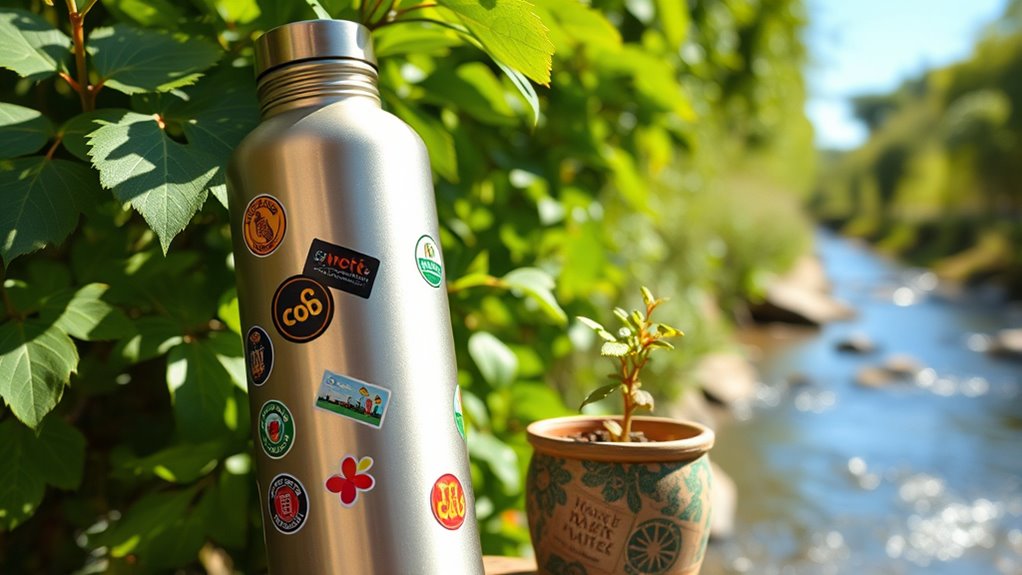
Switching to refillable water bottles is another impactful choice that complements your efforts in using reusable bags.
By opting for a reusable bottle, you significantly reduce plastic waste and help protect wildlife. You'll also lower your carbon footprint since fewer greenhouse gases are emitted in the production of these bottles. Additionally, choosing fresh fruit juices can provide essential vitamins and nutrients that are often lacking in sugary drinks. For a fun treat, you could even enjoy Birthday Cake Ice Cream, which combines the joy of celebrations with a sustainable mindset.
Not to mention, using tap water cuts energy consumption by up to 85% compared to bottled water, and it's important to ensure that any juice you choose is fresh and safe to maximize your health benefits. Economically, you'll save money over time, as you won't need to keep buying bottled water.
Plus, stainless steel or glass bottles are safer and free from harmful chemicals. Additionally, freshly squeezed juices can serve as a refreshing alternative to sugary drinks, further promoting a sustainable lifestyle. Embrace this sustainable habit, and you'll not only improve your health but also inspire others to make eco-friendly choices.
Buy Second-Hand Items

Buying second-hand items is a powerful way to make a positive impact on the environment and your wallet. When you choose pre-loved clothing, you divert textiles from landfills, reducing the massive waste generated by the fashion industry. Each second-hand purchase prevents one more item from entering a landfill, promoting a culture of reuse that supports sustainable consumption. For instance, many foraging groups in different states emphasize the importance of sustainable harvesting practices which aligns with the principles of reusing and recycling. Additionally, opting for second-hand items like clothing or household goods can help reduce the demand for new products that often rely on high resource consumption.
Moreover, engaging in responsible foraging practices can similarly enhance the sustainability of our food sources while supporting local ecosystems. By extending the life of existing garments, you conserve valuable resources like water and energy, minimizing your carbon footprint. Plus, second-hand shopping often involves local transactions, which cuts down on transportation emissions. This practice not only champions ethical consumption but also fosters community support, making it a win-win for you and the planet. Additionally, purchasing second-hand Waldorf toys can enhance imaginative play for children while promoting eco-friendliness.
Compost Food Waste

Composting food waste not only reduces the amount of trash you send to landfills but also transforms organic scraps into a valuable resource for your garden.
When you compost, you help cut down on methane emissions, a potent greenhouse gas produced by food waste in landfills. By enriching your soil with compost, you decrease the need for expensive synthetic fertilizers and improve plant health by suppressing diseases and pests. Additionally, using compost can enhance the effectiveness of your backyard greenhouse by providing a nutrient-rich growing medium that supports healthy plant growth. This practice aligns with the principles of emergency preparedness by fostering self-sufficiency and resilience in your home garden. Moreover, composting contributes to biodiversity hotspots by providing essential nutrients that support diverse plant and animal life in your local ecosystem.
Plus, composting can save municipalities money on waste management, contributing to job creation and economic growth. You'll also support community wellness by providing nutrient-rich resources for local gardens and parks. Additionally, using compost in your garden can enhance soil quality, making it more resilient and capable of supporting sustainable forestry practices.
Embracing composting is a simple yet impactful way to promote sustainability and improve your garden's vitality.
Install LED Light Bulbs

By choosing to install LED light bulbs, you can significantly reduce your energy consumption while enjoying better lighting in your home.
LEDs are up to 80-90% more energy-efficient than incandescent bulbs, converting most of their energy into light instead of heat. This means you'll save on your electricity bills and contribute to lower carbon emissions. Additionally, using energy-efficient technology like LED bulbs supports sustainable living practices that help reduce overall environmental impact. Moreover, the switch to LED lighting contributes to lower carbon emissions, promoting a healthier environment. The forex market operates 24 hours, making it essential to monitor energy prices globally.
Experience significant energy savings with LEDs, which are 80-90% more efficient than incandescent bulbs, reducing bills and carbon emissions.
With a lifespan of 25,000 to 50,000 hours, LEDs require fewer replacements, cutting down on waste and resource usage. They emit less heat, reducing the risk of burns and fires, and they don't contain harmful materials like mercury.
Plus, their improved lighting quality enhances visibility. Additionally, the switch to LED bulbs aligns with energy-efficient technology that promotes sustainable living practices. Make the switch to LED bulbs today for a sustainable and cost-effective lighting solution!
Use Public Transportation
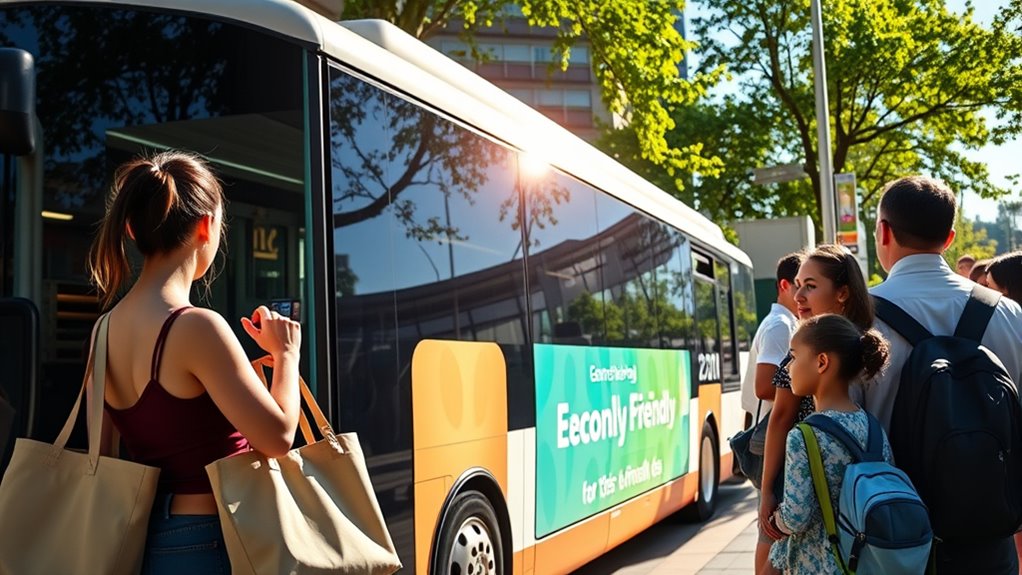
Making small changes at home, like switching to LED light bulbs, can lead to significant energy savings.
One impactful shift you can make is to use public transportation. By opting for buses, trains, or subways, you'll reduce greenhouse gas emissions significantly—up to 76% compared to driving alone. Furthermore, this choice supports local economies and encourages the growth of sustainable transportation options. Using public transport also contributes to energy efficiency, as it reduces overall energy consumption from personal vehicles. In fact, advancements in renewable energy technologies are forecasted to increase efficiency by over 40%, making public transport an even more viable option.
Public transport not only conserves energy, saving the U.S. 4.2 billion gallons of gasoline annually, but also cuts down on congestion, saving you time.
Plus, it provides access to jobs and services, promoting equitable development in your community.
Investing in public transit helps create more livable cities while supporting economic growth.
Additionally, using employer-sponsored retirement accounts can help you allocate savings towards sustainable living initiatives.
Embrace this change, and you'll contribute to a healthier planet while enjoying the benefits of efficient travel.
Eat Less Meat

Although it might seem challenging, eating less meat can significantly benefit both your health and the environment. By reducing your meat intake, you can lower greenhouse gas emissions, as meat production accounts for up to 19% of these emissions globally.
Moreover, cutting back on meat helps combat deforestation, as livestock farming drives 75% of tropical deforestation. You'll also contribute to better water conservation, since animal agriculture heavily strains water resources.
On a personal level, eating less meat can lower your risk of cardiovascular diseases and certain cancers. Embrace alternatives like plant-based proteins or designate meat-free days to ease the transition.
These small changes can lead to a healthier lifestyle and a more sustainable planet.
Choose Eco-Friendly Cleaning Solutions

Reducing your meat consumption is just one step towards a more sustainable lifestyle.
Choosing eco-friendly cleaning solutions can significantly improve your home's health and the planet's well-being. By using products free from harmful chemicals like ammonia and bleach, you reduce your exposure to respiratory issues and skin irritations.
Eco-friendly cleaners emit fewer VOCs, enhancing your indoor air quality and lowering allergy risks for you, your pets, and your kids. Plus, they often come in biodegradable packaging, minimizing waste.
These cleaners are also cost-effective in the long run, as many can be diluted for multiple uses. Embracing these alternatives supports sustainable practices, contributing to a healthier future for everyone.
Adopt a Minimalist Mindset

When you embrace a minimalist mindset, you open the door to a simpler, more intentional life. This approach encourages you to buy fewer items, reducing waste and your ecological footprint.
You'll find that less clutter leads to mental clarity, easing stress and anxiety. Financially, living with fewer possessions can save you money and lower your debt. By prioritizing quality over quantity, you're making more sustainable choices that last.
Less clutter fosters mental clarity, reduces stress, and promotes financial savings through mindful consumption and lasting quality.
Embracing minimalism also promotes practices like reusing and recycling, allowing you to align your values with sustainable living. As you cultivate gratitude for what you already own, you'll discover a deeper contentment and a focus on meaningful experiences rather than material possessions.
This mindset shift can truly transform your life.
Support Sustainable Businesses
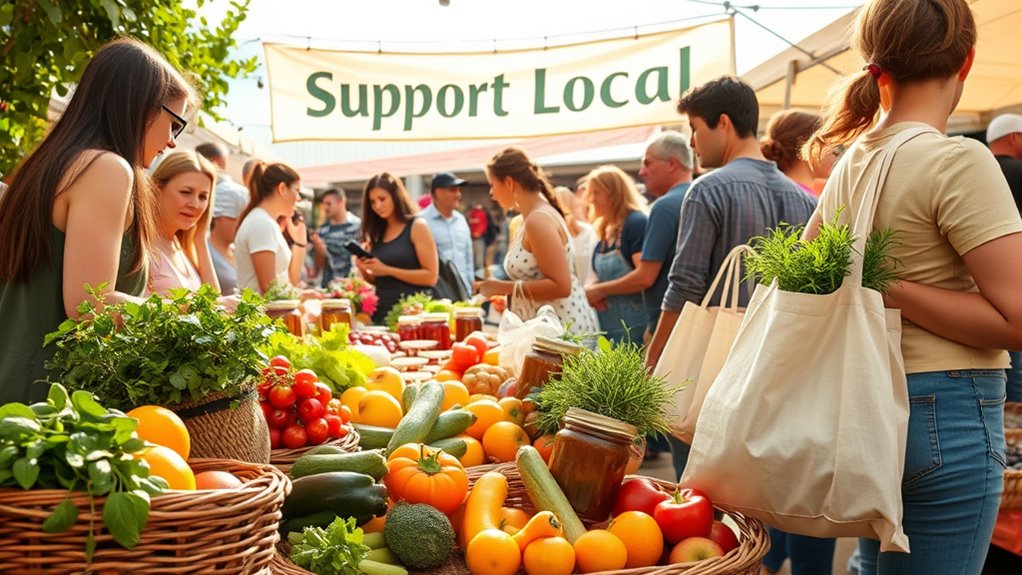
Supporting sustainable businesses not only benefits the environment but also empowers you to make a positive impact with your purchasing decisions. By choosing brands like Tesla, Patagonia, or Seventh Generation, you're investing in companies that prioritize eco-friendly practices.
Look for labels that guarantee ethical sourcing or biodegradable packaging. Supporting Fair Trade products ensures fair wages for workers, while companies like IKEA and Unilever focus on renewable energy and minimal waste.
Your choices can reduce waste, conserve resources, and contribute to climate action, fostering a healthier planet. Plus, sustainable businesses often benefit from cost savings and innovation, which enhances their growth.
Frequently Asked Questions
How Do I Start Composting at Home?
To start composting at home, choose a spot with good drainage and easy access, like your backyard or balcony.
You can use a store-bought bin or make one from wire mesh.
Begin layering brown materials like dry leaves and twigs, followed by green materials like vegetable scraps and coffee grounds.
Turn the pile regularly to aerate it, and keep it moist, like a wrung-out sponge.
Soon, you'll have nutrient-rich compost for your plants!
What Are the Benefits of Using Public Transportation?
Using public transportation is like finding a hidden treasure chest for your wallet and the planet.
You'll save money while generating economic returns, as every dollar spent on transit yields up to five in benefits. Not only does it create jobs, but it also enhances air quality and reduces emissions.
Plus, you'll enjoy increased mobility and a healthier lifestyle, all while contributing to a more connected and vibrant community.
Why not hop on board?
How Can I Find Second-Hand Shops Near Me?
To find second-hand shops near you, start by using online directories like Goodwill or Salvation Army to locate stores by zip code.
Check local classifieds or community boards for listings, and don't forget to explore social media for reviews.
Asking friends or neighbors for recommendations can lead you to hidden gems.
Finally, utilize Google Maps to pinpoint thrift stores in your area for a convenient shopping experience.
What Are Some Easy Plant-Based Meal Ideas?
Imagine your kitchen as a vibrant canvas, waiting for you to paint it with colors of health and flavor.
For easy plant-based meals, try a chickpea omelet for breakfast, or whip up a tofu scramble on toast.
For lunch, consider a chickpea salad sandwich or a spicy vegan taco.
As the sun sets, enjoy a comforting lentil soup or a hearty black bean burger.
Each meal is a delicious step towards nourishing your body and soul.
How Do I Identify Eco-Friendly Products When Shopping?
When you're shopping for eco-friendly products, start by checking for clear ingredient transparency.
Look for third-party certifications like USDA Organic or Fair Trade to ensure quality.
Pay attention to sustainable packaging options and research the brand's reputation to gauge their commitment to sustainability.
Finally, read consumer reviews; they can provide insight into both effectiveness and eco-friendliness.
Always be cautious of vague claims that don't back up their green promises.
Conclusion
By making these small changes, you'll be like a pebble creating ripples in a pond, sparking positive impact for the planet. Each choice you make adds up, paving the way for a more sustainable lifestyle. It's easier than you think to contribute to a healthier Earth. So, grab those reusable bags, switch to refillable bottles, and embrace the power of conscious living. Every little step counts, and together, we can create a brighter, greener future.
